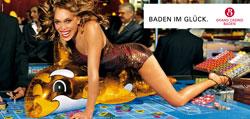Renewed sexism allegations against Casino Baden
The permissive campaigns of the Baden casino are always a topic of discussion. An SP politician now wants to prevent them politically.
In 2006, the Swiss Fairness Commission (SLK) reprimanded a casino campaign in which a scantily clad woman lolls on an inflatable dolphin - alluding to the claim "Bathing in happiness" (Werbewoche.ch reported). SLK intervened because there was no natural connection between the advertised product and the female body - and called the campaign sexist and derogatory.

As a result of the reprimand, the Grand Casino Baden subsequently dispensed with the subject. At least in public. The posters in question were distributed to the casino's adult visitors as part of a promotional campaign so that they could be hung up in private (Werbewoche.ch reported). As was the case for the entire campaign, the Weber Harbeke agency was also responsible for this campaign.
The following campaigns were also controversial and provoked accusations of sexism. Even without the dolphin, the subjects were always revealing. In 2008, there were not only plunging necklines, but also male six-packs on display (Werbewoche.ch reported):

Also the Poster campaign launched in 2012 with Swiss model Sira Topic caused a stir - and complaints to the Fairness Commission.


This time, however, the SLK's rebuke failed to materialize. If lightly dressed ladies advertised the gaming, entertainment, restaurant and bar offerings of a casino, this was not gender discriminatory, according to the SLK's ruling (Werbewoche.ch reported). This is because the average consumer nowadays no longer expects only prize games in a casino and is also aware that singers and barmaids can be rather lightly dressed there. The objectionable subjects would therefore indicate how the advertised services are actually provided.
From the point of view of the SLK, the perception of the average consumer is therefore decisive. This should not include Andrea Arezina, a member of Baden's municipal council, who in the past was involved in the Juso and with Solidar Suisse was responsible for campaign work. As the newspaper Schweiz am Sonntag writes in its current issue, the SP politician is bothered by the posters in the city of Baden. According to Arezina, these are sexist and fit in with the general trend of portraying women in advertising as products and thus degrading them. Her indignation now goes so far that she wants to take political action against the posters. The casino is 51 percent owned by the city of Baden, which is represented on the board of directors by Deputy Mayor Markus Schneider. In a question to the city council, Arezina is now indirectly asking Schneider to speak out against sexist advertising in the board of directors - which, by the way, consists exclusively of men.
Casino boss Detlef Brose comes to the defense of the campaign in an interview with Schweiz am Sonntag and rejects the sexism accusations. The clothing of the internationally known model is a reference to the 1920s and burlesque. This refers to the entertainment offer of the casino. A withdrawal of the campaign is not up for discussion, since neither the SLK, nor the casino management recognizes an inappropriate representation of sexuality or even gender discrimination. The SLK, in turn, points out, however, that it is merely making recommendations to the industry and that it is not a precedent for whether advertising will be fought by political means. Arezina's request is therefore not off the table, but will be dealt with in the residents' council meeting on September 1, 2015.
Incidentally, the fact that political action is being taken against the Baden casino's advertising is nothing new. In response to the 2006 campaign described above, the Grand Council, and in particular a motion by EVP Grand Councilor Lilian Studer, demanded that oversexualized and sexist advertising be banned from public spaces. However, the government rejected the requested law because it considered the necessary legal definition of the two terms unrealistic (Werbewoche.ch reported). The Aargau government supported the principle of self-regulation by the Fairness Commission and thus followed the Federal Council's line of argument. Pornographic advertising, on the other hand, is prosecuted under criminal law. (hae)








